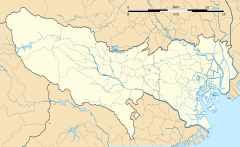Keisei Hikifune Station
KS46 Keisei Hikifune Station 京成曳舟駅 | |||||||||||
|---|---|---|---|---|---|---|---|---|---|---|---|
 The west entrance in April 2017 | |||||||||||
| General information | |||||||||||
| Location | Sumida-ku, Tokyo Japan | ||||||||||
| Coordinates | 35°43′07″N 139°49′13″E / 35.71861°N 139.82028°E | ||||||||||
| Operated by | |||||||||||
| Line(s) | KS Keisei Oshiage Line | ||||||||||
| Platforms | 2 side platforms | ||||||||||
| Tracks | 2 | ||||||||||
| History | |||||||||||
| Opened | 3 November 1912 | ||||||||||
| Previous names | Hikifune (until 1931) | ||||||||||
| Services | |||||||||||
| |||||||||||
| |||||||||||
Keisei Hikifune Station (京成曳舟駅, Keisei-Hikifune-eki) is a railway station on the Keisei Oshiage Line in Sumida, Tokyo, Japan, operated by the private railway operator Keisei Electric Railway.
Lines
[edit]Keisei Hikifune Station is served by the 5.7 km Keisei Oshiage Line, and is located 1.1 km from the starting point of the line at Oshiage.[1]
Station layout
[edit]This station consists of two side platforms serving two tracks.
Platforms
[edit]| 1 | KS Keisei Oshiage Line | for Oshiage A Toei Asakusa Line for Nihombashi, Shimbashi, and Nishi-magome KK Keikyu Line for Shinagawa, Haneda Airport (Int'l Terminal and Domestic Terminal), and Misakiguchi |
| 2 | KS Keisei Oshiage Line | for Aoto, Keisei Funabashi, and Narita Airport (Terminal 2·3 and Terminal 1) HS Hokusō Line for Imba Nihon-idai |
-
The platforms in September 2015
History
[edit]The station opened on 3 November 1912, initially named Hikifune Station (曳舟駅).[1] It was renamed Keisei Hikifune on 18 November 1931.[1]
Station numbering was introduced to all Keisei Line stations on 17 July 2010; Keisei Hikifune was assigned station number KS46.[2][3]
-
The west entrance in October 2007 before rebuilding
In the 2015 data available from Japan’s Ministry of Land, Infrastructure, Transport and Tourism, Keisei-Hikifune → Oshiage was one of the train segments among Tokyo's most crowded train lines during rush hour.[4]
Surrounding area
[edit]See also
[edit]References
[edit]- ^ a b c Terada, Hirokazu (19 January 2013). データブック日本の私鉄 [Databook: Japan's Private Railways]. Japan: Neko Publishing. p. 210. ISBN 978-4-7770-1336-4.
- ^ "京成線各駅で「駅ナンバリング」を導入いたします" ["Station numbering" will be introduced to each station on the Keisei Line] (PDF). keisei.co.jp (in Japanese). Archived from the original (PDF) on 28 September 2022. Retrieved 25 February 2023.
- ^ "京成と京急が駅ナンバリングを導入" [Keisei and Keikyu to introduce station numbering]. Tetsudo News (in Japanese). 6 June 2010. Archived from the original on 26 February 2023. Retrieved 26 February 2023.
- ^ "Most Crowded Rush Hour Train Lines in Tokyo". Blog. 4 May 2017. Retrieved 11 August 2024.
External links
[edit]- Official website (in Japanese)




